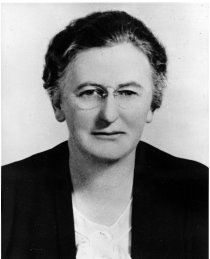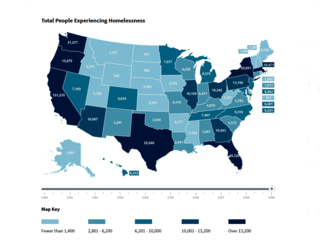
Mary Williams (Molly) Dewson (1874–1962) was an American feminist and political activist. After graduating from Wellesley College in 1897, she worked for the Women's Educational and Industrial Union. She became an active member of the National Consumers League (NCL) and received mentorship from Florence Kelley, a famous advocate for social justice feminism and General Secretary of the NCL. Dewson's later role as civic secretary of the Women's City Club of New York (WCCNY) led to her meeting Eleanor Roosevelt, who later convinced Dewson to be more politically active in the Democratic Party. Dewson went on to take over Roosevelt's role as head of the Women's Division of the Democratic National Campaign Committee. Dewson's "Reporter Plan" mobilized thousands of women to spread information about the New Deal legislation and garner support for it. In connection with the Reporter Plan, the Women's Division held regional conferences for women. This movement led to a historically high level of female political participation.

Henry Gabriel Cisneros is an American politician and businessman. He served as the mayor of San Antonio, Texas, from 1981 to 1989, the second Latino mayor of a major American city and the city's first since 1842. A Democrat, Cisneros served as the 10th Secretary of Housing and Urban Development (HUD) in the administration of President Bill Clinton from 1993 to 1997. As HUD Secretary, Cisneros was credited with initiating the revitalization of many public housing developments and with formulating policies that contributed to achieving the nation's highest ever rate of home ownership. In his role as the President's chief representative to the cities, Cisneros personally worked in more than two hundred cities spread over all fifty states. Cisneros' decision to leave the HUD position and not serve a second term was overshadowed by controversy involving payments to his former mistress.

Homelessness in the United States refers to the issue of homelessness, a condition wherein people lack "a fixed, regular, and adequate nighttime residence" as defined by The McKinney–Vento Homeless Assistance Act. Point-in-time single night counts prepared by shelter providers differ greatly from federal government accounts. In 2014, approximately 1.5 million sheltered homeless people were counted. The federal government statistics are prepared by the United States Department of Housing and Urban Development's Annual Homeless Assessment Report; as of 2018, HUD reported there were roughly 553,000 homeless people in the United States on a given night, or 0.17% of the population. Annual federal HUD reports contradict private state and local reports where homelessness is shown to have increased each year since 201 across several major American cities, with 40 percent increases noted in 2017 and in 2019. In January of 2018 the federal government statistics gave comprehensive encompassing nationwide statistics, with a total number of 552,830 individuals, of which 358,363 (65%) were sheltered in provided housing, while some 194,467 (35%) were unsheltered.

Westchester Community College (WCC) is a public community college in Valhalla, New York. It is sponsored by Westchester County and the State University of New York (SUNY).
Roxanne Qualls is a former Democratic mayor of Cincinnati, Ohio, having served from December 1993 to November 1999. She also served a two-year term on the Cincinnati City Council prior to her service as mayor, having been elected in 1991. On August 8, 2007, the Charter Committee announced her appointment to fill the unexpired term of council member Jim Tarbell. Qualls was elected to a two-year term on Cincinnati City Council in November 2007, and again in 2009 and 2011. She served as Vice Mayor, the chair of the Budget and Finance Committee, chair of the Livable Communities Committee and chair of the Subcommittee on Major Transportation and Infrastructure Projects.

Arthur Christ Agnos is an American politician. He served as the 39th mayor of San Francisco, California from 1988 to 1992 and as the Regional Head of the United States Department of Housing and Urban Development from 1993 to 2001.
Princeton AlumniCorps is an American nonprofit organization established in 1989 as Princeton Project 55. Members of the Class of 1955 at Princeton University established the organization to mobilize alumni and students, and others who share their concerns, to provide civic leadership and to develop and implement solutions to systemic problems that affect the public interest. Princeton AlumniCorps is an independent nonprofit 501(c)(3) organization.
Supportive housing is a combination of housing and services intended as a cost-effective way to help people live more stable, productive lives, and is an active "community services and funding" stream across the United States. Supportive housing is widely believed to work well for those who face the most complex challenges—individuals and families confronted with homelessness and who also have very low incomes and/or serious, persistent issues that may include substance use disorders, mental health, HIV/AIDS, chronic illness, diverse disabilities or other serious challenges to stable housing. Supportive housing can be coupled with such social services as job training, life skills training, alcohol and substance use disorder treatment, community support services, and case management to populations in need of assistance. Supportive housing is intended to be a pragmatic solution that helps people have better lives while reducing, to the extent feasible, the overall cost of care. As community housing, supportive housing can be developed as mixed income, scattered site housing not only through the traditional route of low income and building complexes.
The New York Community Trust is the community foundation for New York City, with divisions in Westchester and Long Island. The New York Community Trust connects past, present, and future generous New Yorkers with vital nonprofits working to make a healthy, equitable, and thriving community for all. It is one of the oldest and largest community foundations in the United States and one of the largest funders of New York City’s nonprofits.
Frank V. Chopp is a Democratic member of the Washington House of Representatives, representing the 43rd district since 1995. His district covers the neighborhoods of Fremont, Wallingford, the University District and Madison Park, all in Seattle. Chopp served as Speaker of the House from 2002 to 2019.

Lenox Hill Neighborhood House is a multi-service community-based organization that serves people in need on the East Side of Manhattan and on Roosevelt Island. Founded in 1894 as a free kindergarten for the children of indigent immigrants and as one of the first settlement houses in the nation, Lenox Hill Neighborhood House is the oldest and largest provider of social, legal and educational services on Manhattan's Upper East Side. Each year, they assist thousands of individuals and families who range in age from 3 to 103, represent dozens of races, ethnicities and countries of origin and "live, work, go to school or access services" on the East Side from 14th Street to 143rd Street and on Roosevelt Island. Their clients include indigent families and the working poor who live in the East Side's housing projects and tenements or who travel to the Upper East Side to work in low-wage jobs such as cashiers, housekeepers, nannies and laborers; 10,000 seniors; and hundreds of mentally ill homeless and formerly homeless adults. They have five locations between 54th and 102nd Streets, offer programs at dozens of East Side locations; their headquarters is located on East 70th Street.

Alice K. Wolf is an American politician. She served as a member of the Massachusetts House of Representatives from 1996 to 2013, representing the 25th Middlesex District. On March 22, 2012, Wolf announced that she would not seek re-election. Her term ended in January 2013.

Homelessness is defined as living in housing that is below the minimum standard or lacks secure tenure. People can be categorized as homeless if they are: living on the streets ; moving between temporary shelters, including houses of friends, family and emergency accommodation ; living in private boarding houses without a private bathroom or security of tenure. The legal definition of homeless varies from country to country, or among different jurisdictions in the same country or region. United States government homeless enumeration studies also include people who sleep in a public or private place not designed for use as a regular sleeping accommodation for human beings. People who are homeless are most often unable to acquire and maintain regular, safe, secure and adequate housing due to income that is inconsistent or lacking altogether. Homelessness and poverty are interrelated. There is no methodological consent on counting the homeless and identifying their special needs; thus in most cities only estimated homeless populations are known.
The Women's Prison Association (WPA), founded 1845, is the oldest advocacy group for women in the United States. The organization has historically focused on New York City and New York State issues. Since 2004 it has developed the Institute on Women & Criminal Justice, to focus a national conversation on women and criminal justice.

The New York Foundation is a charitable foundation which gives grants to non-profit organizations supporting community organizing and advocacy in New York City.

Family homelessness refers to a family unit(often blood related) who do not have access to long term accommodation due to various circumstances such as socioeconomic status, access to resources and relationship breakdowns. In some Western countries, such as the United States, family homelessness is a new form of poverty, and a fast growing group of the homelessness population. Some American researchers argue that family homelessness is the inevitable result of imbalanced “low-income housing ratio” where there are more low-income households than there are low-cost housing units. A study in 2018 projected a total of 56,342 family households were recognized as homeless. Roughly 16,390 of these people were living in a place not meant for human habitation. It is believed that homeless families make up about a third of the United States’ population, with generally women being the lead of the household.
Arise for Social Justice is a grassroots organization focused on furthering the rights of low-income people formed in 1985 in Springfield, Massachusetts. Founding members centered the early activism of the group around their shared identity as women on welfare.
Arthur Ellis is a Democratic member of the Maryland Senate from the 28th district in Charles County.

Socialhousekeeping, also known as municipal or civil housekeeping, was a socio-political movement that occurred primarily through the 1880s to the early 1900s in the Progressive Era around the United States.











